Programs
YOUNG CHILDREN’S COMMUNITY
(Infant - 12mths & Toddler - 19 mths)
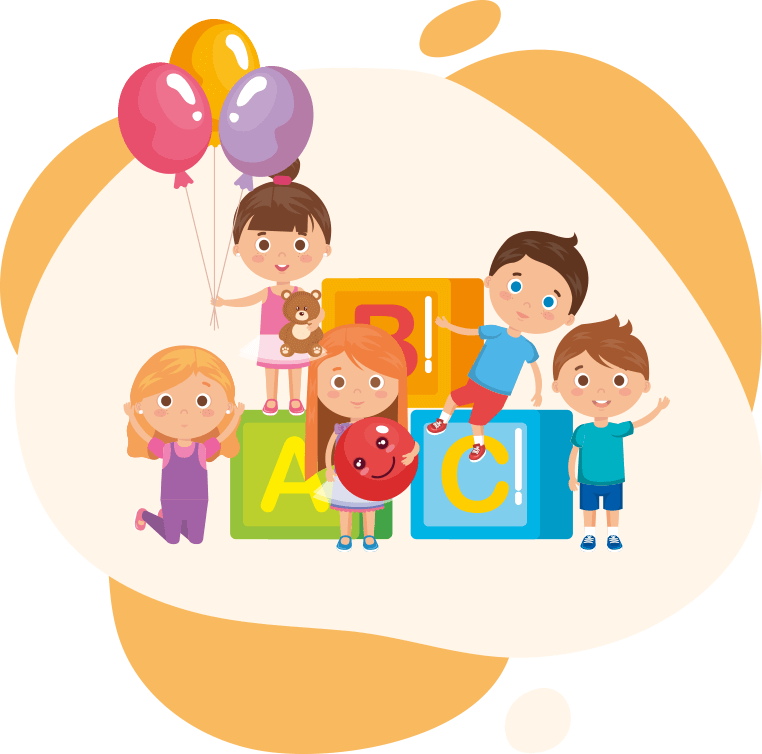
The first few years of a child’s life is critical to their personality and intellectual development.
Children at this stage of life may be showing a variety of development levels. They may not yet be walking, drinking from a bottle or just learning to drink from a cup. These children need loving attention throughout the day. The guide focuses on fostering basic trust in the child by responding to the child’s needs in a loving and caring manner. The guide prepares an attractive environment according to the children’s developmental needs.
As these children grow (19 mths to 3 yrs), the guide will offer them basic Montessori materials; movement-based activities for their growing physical and intellectual needs. The guide will encourage social interaction with other children, support in development of language, gross motor co-ordinations, and visual discrimination through the senses and learning materials.
MONTESSORI PROGRAM
(2.5 yrs and up)
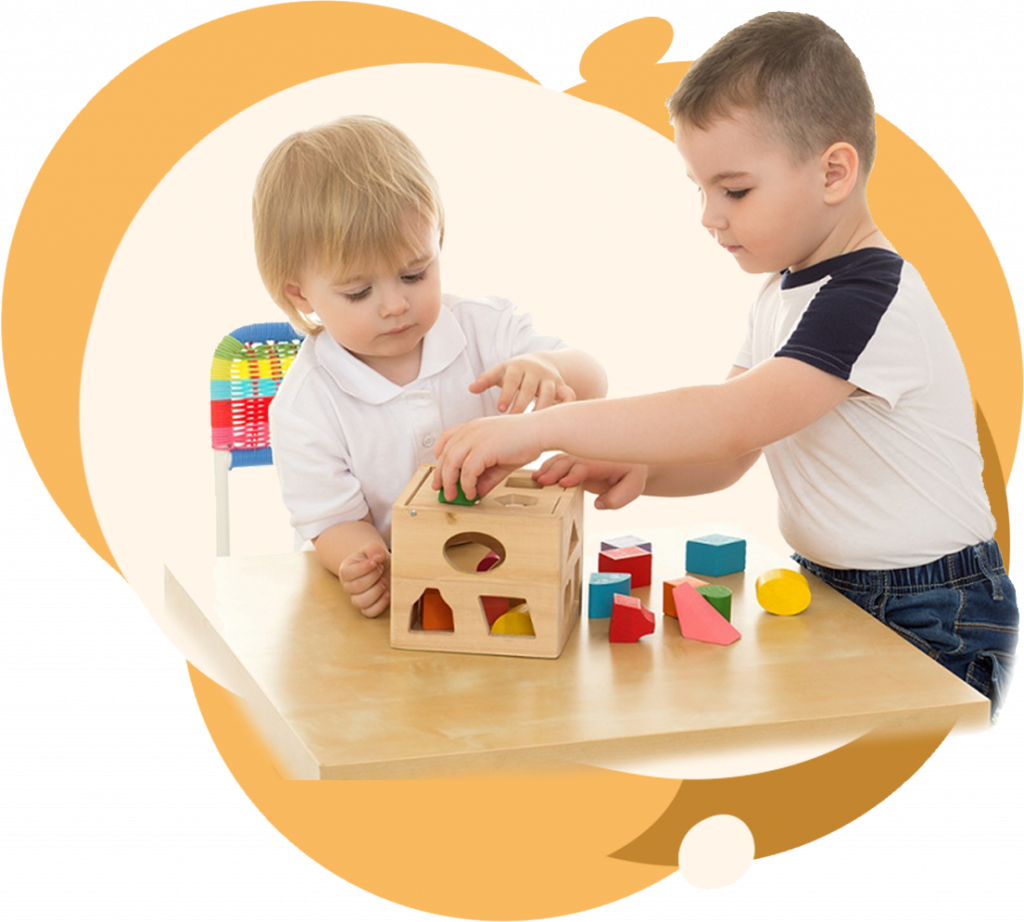
The Kinderhaus Montessori program helps children reach their full potential in all areas of life. Our classroom is calm, orderly, and filled with self-correcting, didactic, scientifically-prepared Montessori materials that meet the child’s educational needs. In our prepared environment children are free to grow, learn, and explore their world. However, this freedom is within the boundaries of the prepared environment. In our Montessori classroom the child is the “center of attention”, not the teacher. The teacher, a role model and a demonstrator, circulates through the classroom, observing and coaching individuals or groups. Children are clustered in groups representing a three year age span. The three year age span in the class provides a family-like grouping where learning can take place naturally. More experienced children share what they have learned, while reinforcing their own learning. Because of this peer-group learning, there is often more conversation and language experiences in our early education setting. Kinderhaus Montessori children, ages 2.5 – 6 years, have the opportunity to develop a foundation of intellectual, social, and physical skills and experiences that will serve them throughout their lives.
We strive to develop:
- A positive attitude towards school and learning
- The ability to think and work independently and then teach others
- Habits of concentration for lifelong study skills
- Inner discipline and a sense of order
- Self-confidence built through learning, doing, creating and achieving
- The joy of exploring and discovering
- Appreciation for nature
- Growth as a friend and member of the group and society
The classroom is arranged according to subject area.The areas in the classroom are practical life, sensorial, language, mathematics, geography, biology, history, art, science, and music.
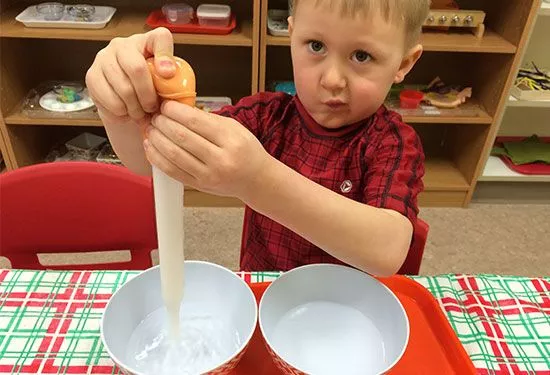
Practical Life Exercises
These are the everyday gestures, activities, and behaviours that the child sees performed by the adults. These exercises are exciting to children because they allow to imitate adults. Imitation is one of the strongest urges during a child’s early years. These exercises help the children to perfect their coordination. Then the children gradually lengthen their span of concentration. They also learn to pay attention to details as they follow a regular sequence of actions. Through these exercises the children also learn to take care of themselves, take care of others, the environment, and to use grace and courtesy. Finally they learn good work habits. Some of the activities are pouring, sponging, folding, sweeping, polishing, washing, cutting, sewing, dressing frames, etc.
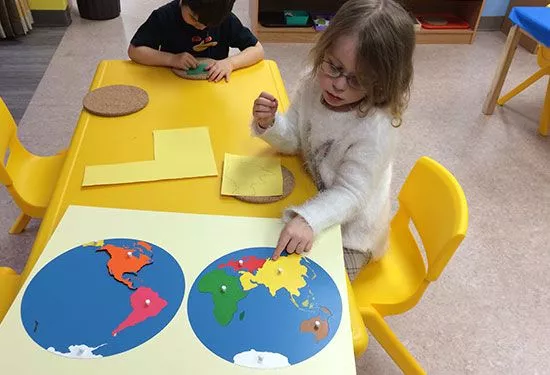
Cultural Subjects
The cultural lessons (Biology, Geography, History, Science, Music, Art, and Nature Study) make the classroom come alive, allowing the children to feel connected to the global human family. Therefore the subjects are not taught individually but as connected parts of a whole. The children learn about other countries, their customs, food, music, climate, language, animals, etc. Children sing, colour, draw, paint, and dance. Therefore the environment awakens creativity and guides well-balanced children towards artistic development. Some materials in the classroom are a botany cabinet, basic animal classification materials, large puzzle maps, musical instruments, and so forth.
Sensorial Exercises
Using sight, sound, touch, taste, and smell, the sensorial materials enable preschool children to order, classify, and comprehend their world. Each of the sensorial materials isolates one defining quality such as colour, weight, shape, texture, size, sound, smell, etc. The equipment emphasizes this one particular quality while eliminating or minimizing other differences. Sense impressions are not enough by themselves. The mind needs education and training to be able to discriminate and appreciate. The Montessori sensorial materials help the child to distinguish, to categorize and to relate new information to what the child already knows.
This process is the beginning of conscious knowledge. It is brought about by the intelligence working in a concentrated way on the impressions given by the senses. This lays the ground work for problem solving and encourages critical, independent thinking. The materials used in our classrooms include Cylinder Blocks, Pink Tower, Brown Stair, Red Rods, Colour Tablets, Touch Boards, Touch Tablets, Fabrics, Sound Cylinders, Smelling Bottles, Tasting Bottles, Geometric Cabinet, Constructive Triangles, etc.
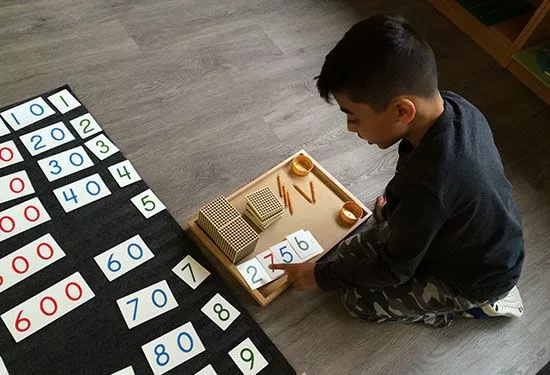
Mathematics
Montessori presents mathematical concepts to children in a concrete, hands-on manner. When children have access to mathematical equipment in their early years, they can easily and joyfully assimilate many facts and skills of arithmetic. Children are able to comprehend numerations, mathematical operations, decimal system, fractions, and so on. Careful designs of materials in mathematics and in the sensorial area lay the groundwork for future learning in algebra and geometry. The math materials provide children with solid concepts of basic mathematical principles. This prepares the child for abstract reasoning and helps to develop problem-solving skills. Some of the materials we use are the number rods, sandpaper numbers, spindle boxes, Seguin boards, decimal system, and thousand chain, etc.
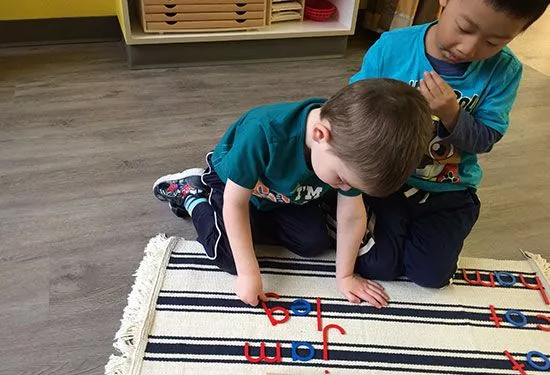
Language
Young children have a natural sensitivity for language development which follows closely on the years when they learn to speak their native language. The child at age 3, 4, and 5 has a unique fascination for words, both printed and spoken. This fascination often enables children to begin reading and writing before the age at which it is traditionally taught. The materials for written language introduce the child to the alphabet and its sounds. In order to simplify the children’s first experience with letters, they are first introduced to the phonetic sounds of the alphabet rather than the names of the letters. After a child has begun to successfully sound out phonetic words they may be introduced to word cards, sentences, and books.
The Program & The Parent
Kinderhaus Montessori believes that parents are a child’s first and most important teacher. Therefore they are encouraged to be actively involved in their child’s education. All three protagonists, the teachers, the children and the parents, all of whom may come from many varied cultural and educational backgrounds together form one community in the Kinderhaus Montessori School. It is a place where all children are seen as powerful and competent individuals, deserving of an exceptional and inspiring environment.
“As soon as children find something interests them they loose their instability and learn to concentrate” – Dr. Maria Montessori
